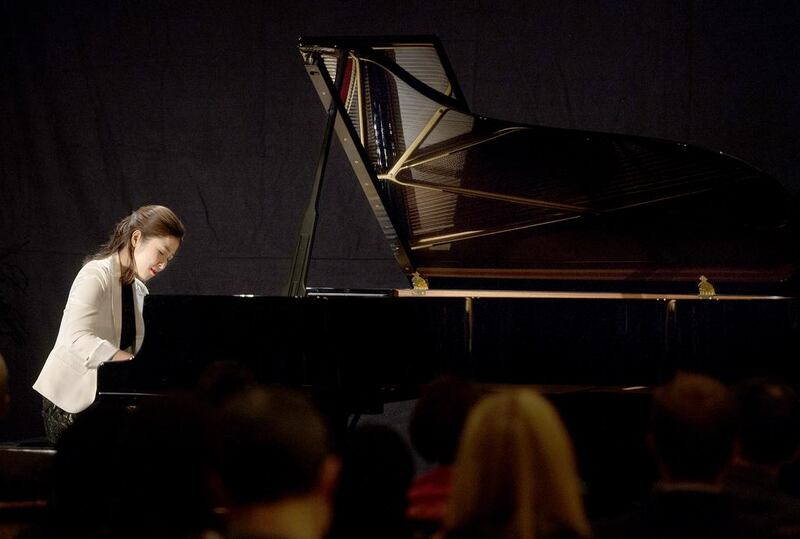The Abu Dhabi Festival began on Tuesday with a show of understated excellence, rather than show-stopping bombast, as the first concert of the new Festival Recital Series kicked off a month of live performances.
Serving as something of a warm- up to the main fortnight of concerts, which begin on March 20, the new addition will showcase three virtuosos in intimate settings, performing to not more than 100 people in a small room at Emirates Palace.
Launching the series was the South Korean pianist Ah Ruem Ahn, who was fearless in her programme. Debate rages about whether Chopin's Preludes were ever meant to be played together as a set. While Bach ordered his 48 preludes in rising semitones – as if a reference book to flick through – Chopin's 24 Preludes are arranged so that a major key is followed by its relative minor, and then its fifth (so C major is followed by A minor, then G major and E minor, and so on).
They were largely written in the winter of 1838, and the form allows a player to move between all 24 musical keys harmoniously in a single sitting. And yet Chopin himself never performed more than four in a single evening. One gets the feeling the Polish composer was laying down a gauntlet even he was not too foolish enough to take up. Yet 176 years later, Ah tackled the challenge with absolute conviction.
Performed together, the Preludes offer a number of oppositions. Arranged as they are in a circle of fifths, the set is defined by the rules of its own neat, rational form. Yet the short pieces – between 12 and 90 bars – overflow with the irrationality of emotion, at turns harrowing and wistful, a microscopic snapshot of Chopin's insight into the human condition.
Moreover, the Preludes are renowned for the dexterity they demand, but where the set could be relegated to a purely technical challenge, the sparsity of arrangements – and the lack of direction on how to link them – offers the player a rare interpretive freedom.
A third opposition comes from the emotional friction the limiting form creates. By ordering the set to flit between major and minor keys so frequently – many pieces last less than a minute – there’s a restless tension for both the audience and performer, as the room’s mood shifts between bright lyricism and dramatic romanticism in the space of a few bars.
The overall effect of hearing the Preludes in recital is like sitting at an ocean's edge, watching as a series of ever-changing waves roll in around you – from clear, pure blue, tropical cascades to ragged, spitting, debris-laden tsunamis crashing at your feet. And it's hard to believe many of those in the room that evening will ever hear them better performed.
The Preludes represent a pianist's right of passage, demanding so many moods, approaches and techniques in a single sitting. Performing entirely from memory, Ah appeared not to be thinking the music, but feeling it.
With great empathy for the material’s pacing, sometimes she barely broke between pieces, other times allowing long looming chords to ring out profoundly for close to 10 second before resuming the recital.
Earlier in the evening, Ah displayed the same empathetic intuition with a deeply moving performance of a work by Schubert, who she says is her favourite composer. The composer's first four Impromptus are another historically important set of varying emotional textures, and one felt the pianist's affection for the work in the ease of her approach to the keys.
The evening opened with an accomplished performance of Haydn's comparatively undemanding Piano Sonata 46.
• The Festival Recital Series continues with Julien Libeer on March 13 and Aisha Syed Castro on March 17. Both performances are sold out. Find out more about the festival at www.abudhabifestival.ae
rgarratt@thenational.ae





